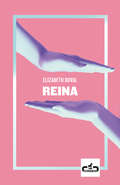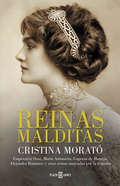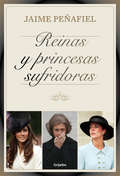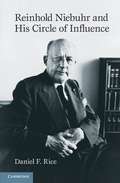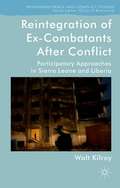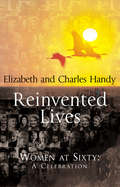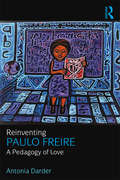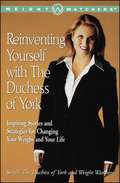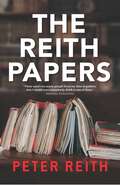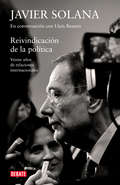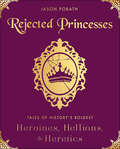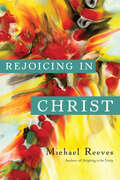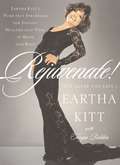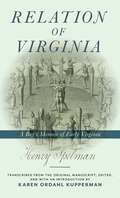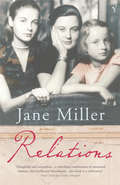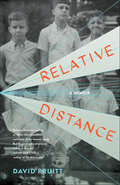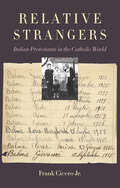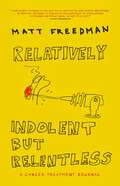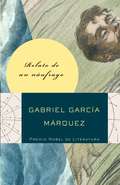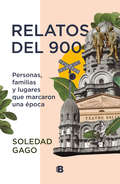- Table View
- List View
Reilly of the White House
by Michael F. ReillyA fascinating memoir by Michael Reilly about his years as the head of the White House Secret Service detail entrusted with keeping President Franklin D. Roosevelt safe during World War II. Reilly gives the inside scoop on how it was done, from borrowing Al Capone's confiscated armored car from the Treasury to move FDR about, to innovating the idea of a secret elevator inside a C-54 transport plane so the disabled President could safely move about the world without being discovered. Facing problems as ordinary as finding a way to burn confidential military dispatches in the White House furnaces without fragments drifting out of the chimneys (Reilly borrowed popcorn baskets from the kitchens), to the exotic (how do you convince the King of Saudi Arabia to come to a secret meeting with the President when the King insists he must bring along his tents, his rugs, all his relatives and his personal flock of sheep? Easy -- transport the King, his entire entourage and the sheep on the fantail of a United States destroyer), Reilly found a way to meet the extraordinary demands of keeping a war-time president safe at home and abroad.
Reina
by Elizabeth DuvalPrimeras memorias en España de una mujer de la generación Z que a los 19 años ya es un referente de la poesía y del activismo. «Yo creo -escribe Elizabeth Duval en Reina - que estaba enamorada de ella porque era como un personaje novelesco, una gran aparición del azar, una fuerza sin rumbo ni dirección alguna.» Aunque a lo largo de la historia el dilema entre la escritura o la vida ha influido en numerosas obras, lo cierto es que la respuesta más sensata siempre estuvo a la vista de todo el mundo, tal y como podemos deducir con la lectura de este libro: la literatura y la vida. Estudiante en París de Filosofía y Letras Modernas, la escritora y activista Elizabeth Duval (Alcalá de Henares, 2000) inicia un diario que inevitablemente acaba transformando su realidad, mediada por una especie de concepción novelesca de la propia existencia. Con un talento excepcional para hacer dialogar su prosa con la historia de las ideas, proponiendo así un interesante dispositivo de estimulación intelectual, a lo largo de Reina circulan numerosos asuntos que zigzaguean entre las esferas de lo público y lo privado. Entre sus temas destacan la vida universitaria como iniciación a la madurez, la política bajo el capitalismo tardío, o el amor postadolescente desde una óptica que desborda todas nuestras expectativas sobre el asunto y lo sublima en una reflexión sobre los afectos y el deseo tan universal como radicalmente nueva. La crítica ha dicho...«Una escritora transfemenina, filósofa, muy precoz y muy impresionante»Luna Miguel «Imparable.»Play Ground «En Reina, abre su corazón con los primeros diarios de una mujer de la Generación Z [...] De lo más esperado de este año.»Begoña Alonso, Elle «Uno de los emblemas más visible de la causa trans.»Tentaciones «La joven madrileña tiene todo para convertirse en la próxima estrella de la filosofía española [. . .] Sorprende, sobre todo, la madurez del discurso de Duval, además de su amplia cultura.»Víctor Lenore, Vozpópuli
Reina Renuente: María Rosa Tudor, la hermana menor del infame rey Enrique VIII
by Geraldine Evans Maria Emilia RuizReina Renuente: María Rosa Tudor, la hermana menor del infame rey Enrique VIII Es una historia Tudor, NO sobre una de las esposas, sino sobre María Rosa, la bella hermana menor de Enrique VIII. UNA NOVELA HISTÓRICA TUDOR ¡No habla sobre ninguna de las seis esposas! Enrique tenía muchos otros parientes, de los cuales la mayoría, debido a su efímera dinastía y a su trémulo derecho a la corona, el siempre inseguro Enrique había ejecutado durante su reinado para asegurar su trono. ¿Puedes imaginarte cómo sería ser la hermana menor del infame rey inglés Enrique VIII? Recuerda que éste fue el rey que tuvo seis consortes, dos de ellas decapitadas. Y aunque la adolescente María Rosa era su hermana favortita (hasta llamó a su famoso barco por ella), sus cambiantes alianzas y su despiadado deseo de hacer las cosas a su manera, lo llevaron a presionar a la joven y bonita María a un odioso matrimonio de estado con el senil y enfermo rey Luis XII de Francia. Pero, una renuente María Rosa, tan decidida como Enrique y apasionadamente enamorada por primera vez del campeón de las justas, Charles Brandon, no se rindió tan fácilmente. Antes de aceptar la unión, después de una incansable campaña de su querido hermano para que diera el sí, María Rosa obtuvo una promesa de Enrique. Una promesa que ella estaba determinada a que él cumpliera. En la corte francesa, María Rosa es acechada por el astuto y encantador pero pervertido Francisco, el heredero al trono de Luis, que incluso a la joven edad de veinte, es un experto seductor. En medio de horribles abrazos conyugales y de las persistentes e indeseadas atenciones de Francisco, María se encuentra en una desesperada e infeliz situación. Pero luego, su enfermo esposo muere, y el lujurioso Francisco asciende al trono francés y al poder absoluto. María Rosa pensó que su situación PREVIA a la muerte de su esposo era díficil, pero luego escucha
Reinas de La Resistencia: Alexandria Ocasio-Cortez (Reinas De La Resistencia Ser.)
by Brenda JonesUna celebración de AOC, la mujer más joven en servir en el Congreso y su nueva superestrella. No hace mucho, nadie podía imaginarse que una latina de veintiocho años se postulase para el Congreso en representación de Queens y el Bronx: era necesario enfrentarse a la maquinaria política de la ciudad, casi exclusivamente blanca y exclusivamente masculina. Pero desde que Alexandria Ocasio-Cortez apareció en la escena con toda su gloria, tweets y tendencia a romper todos los esquemas, el rostro de la política del siglo XXI ha cambiado. Hoy, Ocasio-Cortez es la principal defensora del progreso, ganando apoyo entre sus colegas y generando admiración secreta entre sus enemigos. Está luchando contra un presidente indignante y una esfera mediática conservadora que la coloca bajo ataque constantemente. ¿Por qué? Porque temen su don de desvelar la verdad ante el poder. Con ilustraciones, investigación profunda y escritos tan puntuales como ella, la serie Reinas de la Resistencia rinde homenaje a esta fenomenal mujer.
Reinas malditas: Emperatriz Sissi, María Antonieta, Eugenia de Montijo, Alejandra Romanov y otras reinas marcadas por la tragedia
by Cristina MoratóLas fascinantes vidas de seis reinas marcadas por la tragedia que no pudieron elegir su destino y que dejaron una profunda huella en la Historia. Excéntricas, caprichosas, rebeldes, ambiciosas... Más allá de un mundo de privilegios, riqueza y poder, todas fueron mujeres de carne y hueso obligadas a llevar sobre sus hombros la pesada carga de un imperio. La vida de estas reinas dista mucho de ser un romántico cuento de hadas. Aunque infinidad de películas y novelas nos han mostrado el rostro más amable de su reinado, en general, fueron muy desdichadas. Todas tienen en común la soledad, el desarraigo, la nostalgia, la falta de amor o el sufrimiento por no poder dar un heredero al trono. También comparten la dolorosa pérdida de sus hijos, los fracasos matrimoniales o el sentirse extranjeras en una corte donde no eran bien recibidas. Las suyas no fueron grandes historias de amor porque sus matrimonios eran un «asunto de Estado». Algunas, como Sissi, fueron emperatrices en contra de su voluntad y enfermaron de melancolía; otras, como Cristina de Suecia, escandalizaron con su extravagante comportamiento y sus ansias de libertad. María Antonieta y Alejandra Romanov comparten un trágico final, mientras que la reina Victoria de Inglaterra y Eugenia de Montijo asumieron con extraordinaria dignidad su papel en los momentos más difíciles. A través de los diarios personales y correspondencia familiar, Cristina Morató nos descubre el lado más humano y menos conocido de unas reinas y emperatrices, maltratadas por la historia, que no pudieron elegir su destino. Reseña:«La corona de Francia es una corona de espinas.»Eugenia de Montijo, emperatriz de los franceses
Reinas y princesas sufridoras
by Jaime PeñafielUn recorrido por los episodios más delicados de las reinas y princesas del siglo XX y XXI de la mano de Jaime Peñafiel, uno de los expertos más reconocidos y polémicos en casas reales. Esta es la historia de unas reinas y unas princesas, guapas, jóvenes, enamoradas y felices el día de su boda, el día que se supone tiene que ser el más dichoso. Salvo la triste y comentadísima excepción de Charlène de Mónaco, todas lucían la mejor de sus sonrisas ante los miles de flashes que inmortalizaban su amor. Pero, para muchas, el camino no había sido nada fácil: atrás quedaban, como en el caso de Beatriz de Holanda o de Victoria de Suecia, la férrea oposición de sus padres y de la sociedad, que no veían con buenos ojos a un «príncipe» con un pasado poco ejemplar. Otras tuvieron que soportar multitud de críticas y comentarios porque no se las consideraba apropiadas -Sonia de Noruega, Grace de Mónaco, Letizia- y algunas han sufrido la humillación de saber que sus consortes compartían lecho con otras mujeres: Diana de Gales, Paola de Bélgica... Y, entre otras, doña Sofía, la principal protagonista de este libro y realísima sufridora esposa, una reina, una profesional, que siempre ha sabido estar en su sitio aunque haya sido a costa de mucho dolor, sufrimiento, silencio y públicos desplantes.
Reinhold Niebuhr and His Circle of Influence
by Daniel F. RiceReinhold Niebuhr, the prominent American theologian, was one of the few religious figures who had a significant impact on the broader society outside the theological community in the United States during the twentieth century. Niebuhr's influence was most pronounced among those associated with historical studies and politics. This book presents Niebuhr in dialogue with seven individuals who each had a major influence on American life: the theologian Paul Tillich, philosopher/educator John Dewey, socialist Norman Thomas, historian Arthur Schlesinger, Jr, international political theorist Hans Morganthau, diplomat George Kennan and Supreme Court Justice Felix Frankfurter. Through a detailed examination of Niebuhr's interactions with these figures, Daniel F. Rice's study offers a survey of mid-twentieth-century theology, political thought and culture.
Reintegration of Ex-Combatants After Conflict
by Walt KilroyReintegration programmes for ex-combatants are supposed to support the wider peace process. This study looks at the way they were carried out in Sierra Leone and Liberia and assesses the degree to which they were conducted in a participatory way. To a large extent, ex-combatants felt that they had received unreliable information and had been afforded little input in the process. Others, whose experience had been more participatory, were faring better in terms of work, economic situation andcommunity relations. Reintegration of Ex-Combatants After Conflict is based on detailed interviews with a wide range of stakeholders, and on a survey and focus group discussions with ex-combatants. Their voices are clearly heard, in both the qualitative and quantitative data. Kilroy explores the important implications for the effect of reintegration programmes on the wider peacebuilding project. Social capital, which affects the peace process, is also highlighted, as the extent to which this can be created or undermined depends on the way the programmes were conducted. Kilroy's insightful study will appeal to all those with an interest in conflict resolution, post-war recovery, and development.
Reinvented Lives: Women at Sixty: A Celebration
by Charles Handy Elizabeth HandyTwenty-eight women, ranging from Anita Roddick and Prue Leith to less well-known names, write their own personal stories which are accompanied by Elizabeth Handy's black and white photographs and an introductory essay by Charles Handy. This generation of women is entering the sixties more healthy, more educated and more energetic than most of their mothers. The subjects in this book provide the models for what has become, for the first time, a new age for many women. Released from most of the cares and responsibilities that accompany midlife for women, they are free to reinvent themselves, to give more time to their career or calling, or to luxuriate in the serenity and friendships that few had time for in the past. Some enter new relationships, some start new careers or go back to study, some find that their work is only now reaching its peak. Many have survived traumas and tragedies, but 'the past is just the prologue' as one of them explains.
Reinventing Paulo Freire
by Antonia DarderOne of the most influential critical educators of the twentieth century, Paulo Freire challenged those educational inequalities and conditions of injustice faced by oppressed populations. In this new edition of Reinventing Paulo Freire, Antonia Darder re-examines his legacy through reflections on Freirean pedagogy and the narratives of teachers who reinvent his work. The fully revised first part provides important historical, political, and economic connections between major societal concerns and educational questions raised by Freire and their link to the contemporary moment, including questions tied to neoliberalism, coloniality, and educational inequalities. At the heart of the book is a critical understanding of how Freire#65533;s pedagogy of love can inform, in theory and practice, a humanizing approach to teaching and learning. Powerful teacher narratives offer examples of a living praxis, committed to democratic classroom life and the emancipation of subaltern communities. The narratives clearly illustrate how Freire#65533;s ideas can be put concretely into practice in schools and communities. These reflections on Freirean praxis are sure to spark conversation and inspiration in teacher education courses. Through a close theoretical engagement of Freire#65533;s ideas and key insights garnered from lived experiences, the book speaks to the ways Freire can still inspire contemporary educators to adopt the spirit of#65533;liberatory pedagogy, By so doing, Reinventing Paulo Freire is certain to advance his theories in new ways, both to those familiar with his work and to those studying Freire for the first time.
Reinventing Yourself with The Duchess of York: Inspiring Stories and Strategies for Changing Your Weight and Your Life
by Weight Watchers Sarah, The Duchess of YorkAre you ready to change your life? Join Sarah, The Duchess of York on an inspiring journey to help you rediscover -- and achieve -- your true goals.Today, The Duchess of York is a confident, single working mother of two girls. But, as most of the world knows, that wasn't always the case. Once targeted by the international press, The Duchess has learned one of life's great lessons: how to uncover what you want out of life and get it. She reveals how the ups and downs of her life -- including her divorce, her financial problems, and the deaths of those close to her -- have made her a stronger, wiser person and a better mother.In the first chapter, "Transforming My Life," The Duchess explores how, when and why she decided to take charge and reinvent her life. In the chapters that follow, readers will discover how they, too, can change their own lives. The book provides a series of self-assessment quizzes and questionnaires, as well as concrete steps you can take to initiate change. Throughout, The Duchess offers her insights, including how each chapter topic relates to her life and what she has learned from others.Reinventing Yourself with The Duchess of York supplies a blueprint for action for anyone seeking to change her life. In an easy-to-follow format, the book provides concrete information and advice on how to use an eight-step plan to achieve your goals -- whether it's losing weight, getting fit, or simply improving your health. Reinventing Yourself also explains how to apply the plan to other areas of life, including changing careers, starting over after divorce, and more.To help inspire you toward your goals, Reinventing Yourself also includes heartwarming and motivating profiles of women who have redefined their lives: Weight Watchers Leaders, real women who have lost weight and transformed their lives in countless ways. In interviews with The Duchess and profiles throughout, these women explore how to make the best of your circumstances, live a happier, healthier life, and change your destiny.
Reith Papers
by Peter ReithPeter Reith was a senior cabinet minister under John Howard from 1996 to 2001. He was the face of the government's tough waterfront reforms and architect of sweeping industrial laws, a major contributor to the Fightback policy, a potential leader of the Liberal Party, a key player in the introduction of the GST, an influential republican in the 1999 referendum and Minister for Defence during the time that it was wrongly claimed that asylum seekers had thrown their children overboard.A relentless diary keeper, Peter Reith kept extensive records of those tumultuous years in over a hundred notebooks he filled with recollections of conversations with his colleagues, discussions in cabinet and his private views and predictions.The Reith Papers is the best of those diary entries from the heart of a government that changed Australia.
Reivindicación de la política: Veinte años de relaciones internacionales
by Javier Solana Lluís BassetUn repaso a los retos del mundo actual a partir de la experiencia de 15 años en primera fila de la política internacional de Javier Solana. «Yo creo en la política... La política no es mera gestión, no es administración, es mucho más que eso. Es que la gente te entienda y que sepa adónde vas. La política tiene que ser pedagogía y tiene que ser liderazgo. En parte es hacer presente el futuro, y para eso hay que tener una visión del futuro.»Javier Solana Desde que en 1995 fuera nombrado secretario general de la OTAN, Javier Solana ha pasado quince años en primera fila de la política internacional. Han sido quince años repletos de acontecimientos: la disolución de la antigua Yugoslavia, la decadencia de Rusia, el auge de China, la aparición del terrorismo islámico, los años de Clinton, de Bush y la llegada de Obama, la expansión de la OTAN y de la Unión Europea, la globalización, la mayor crisis económica desde 1929... Gracias a su experiencia y en muchas ocasiones a su presencia en las cumbres y reuniones que definieron momentos históricos, Solana presenta, guiado por las inteligentes preguntas de un periodista de prestigio como es Lluís Bassets, un fascinante panorama del mundo actual, los retos a los que nos enfrentamos y cómo se hizo la transición del mundo estable de la guerra fría a las incertidumbres del actual. Dos ideas y un principio vertebran el libro: Occidente se ha impuesto a costa de perder poder frente a las potencias emergentes, como Brasil, China o la India; Europa se empezó justificando como reconciliación tras la guerra, luego estabilización tras la caída del Muro, pero ahora se fundamenta en la necesidad para no pasar a la irrelevancia. Y el principio es la inquebrantable fe en la política como la manera de conciliar intereses, alcanzar objetivos y evitar conflictos. Un libro esencial, plagado de anécdotas y de retratos de primera mano, por el español más importante en la escena internacional de los últimos tiempos.
Rejected Princesses: Tales of History's Boldest Heroines, Hellions, & Heretics
by Jason PorathBlending the iconoclastic feminism of The Notorious RBG and the confident irreverence of Go the F**ck to Sleep, a brazen and empowering illustrated collection that celebrates inspirational badass women throughout history, based on the popular Tumblr blog. Well-behaved women seldom make history. Good thing these women are far from well behaved . . . Illustrated in a contemporary animation style, Rejected Princesses turns the ubiquitous "pretty pink princess" stereotype portrayed in movies, and on endless toys, books, and tutus on its head, paying homage instead to an awesome collection of strong, fierce, and yes, sometimes weird, women: warrior queens, soldiers, villains, spies, revolutionaries, and more who refused to behave and meekly accept their place. An entertaining mix of biography, imagery, and humor written in a fresh, young, and riotous voice, this thoroughly researched exploration salutes these awesome women drawn from both historical and fantastical realms, including real life, literature, mythology, and folklore. Each profile features an eye-catching image of both heroic and villainous women in command from across history and around the world, from a princess-cum-pirate in fifth century Denmark, to a rebel preacher in 1630s Boston, to a bloodthirsty Hungarian countess, and a former prostitute who commanded a fleet of more than 70,000 men on China’s seas.
Rejoicing in Christ
by Michael Reeves2016 Christianity Today Beautiful Orthodoxy Book of the Year Finalist
Rejuvenate!
by Tonya Bolden Eartha KittThe purr-fect guide to staying mentally and physically healthy and vital from the legendary star who defines longevity. From her hit songs in the 1950s and television stardom as Catwoman on Batman in the 1960s to her sold-out shows at New York's Café Carlyle in the 1990s, her Tony-nominated role on Broadway in 1999, and her hilarious performance as Yzma, the villainess in Disney's The Emperor's New Groove in 2000, Eartha Kitt is one of America's most versatile and enduring performers. Now, at seventy-four and still going strong, Kitt reveals her secrets of vitality in Rejuvenate!, an elegant and inspiring book. Seductive, provocative, amusing, and calming, she combines the lessons of her life -- from a difficult childhood in the South and in Harlem to the joys and challenges of her life in the public eye -- to offer this wise window into her incredible mental and physical vigor and an open invitation to the joys of aging in style. Rejuvenate! is a simple, user-friendly guide that doesn't require a gym, a personal trainer, or even exercise equipment. Each of the nine chapters, with titles such as "Bend," "Stretch," and "Rock-and-Roll," features one basic exercise for the body with easy-to-follow instructions and an entertaining, inspiring message for the mind.
Relation of Virginia: A Boy's Memoir of Life with the Powhatans and the Patawomecks
by Henry SpelmanA memoir of one of America’s first adventurers, a young boy who acted as a link between the Jamestown colonists and the Patawomecks and Powhatans.“Being in displeasure of my friends, and desirous to see other countries, after three months sail we come with prosperouswinds in sight of Virginia.” So begins the fascinating tale of Henry Spelman, a 14 year-old boy sent to Virginia in 1609. One of Jamestown’s early arrivals, Spelman soon became an integral player, and sometimes a pawn, in the power struggle between the Chesapeake Algonquians and the English settlers. Shortly after he arrived in the Chesapeake, Henry accompanied another English boy, Thomas Savage, to Powhatan’s capital and after a few months went to live with the Patawomeck chief Iopassus on the Potomac. Spelman learned Chesapeake Algonquian languages and customs, acted as an interpreter, and knew a host of colonial America’s most well-known figures, from Pocahontas to Powhatan to Captain John Smith. This remarkable manuscript tells Henry’s story in his own words, and it is the only description of Chesapeake Algonquian culture written with an insider’s knowledge. Spelman’s account is lively and insightful, rich in cultural and historical detail. A valuable and unique primary document, this book illuminates the beginnings of English America and tells us much about how the Chesapeake Algonquians viewed the English invaders. It provides the first transcription from the original manuscript since 1872.
Relations
by Jane MillerIn this remarkable book, Jane Miller writes about the experience of being a daughter and a sister, about the intensities of family life and the illuminations that come from the last days of parents. Relations describes a record-keeping kinship and offers portraits of her parents' long marriage, its mysteries and incompatibilities, of her grandfather, the scientist Redcliffe Salaman, and of her great-aunt Clara Collet, one of the first women civil servants. It is a story in which Karl Marx and George Gissing have parts to play.Here are the tensions of belonging and yet not belonging to an English middle-class at once hospitable to difference and internally divided. More than two hundred years of English history are present in these portraits, which show the dawning emancipation of women and the effects of empire on family life. It is the story of an evolution, of a move out of trade towards public service and the professions, and towards the dramas and family romance of recent times.
Relationship Status: My survival guide to love, dating and heartbreak
by Anastasia KingsnorthThe Top 5 Sunday Times bestsellerThe world of dating has never been more complicated, from situationships to soft launches, red flags, beige flags and everything in between. Let’s face it, it’s a lot of fun, but it can also be confusing! I’ve recently re-entered my single girl era and want to take you along for the ride as I dive into the world of modern relationships and how to navigate them, sharing the awkward, the cute and the cringey moments that come with it. I’ve held nothing back, spilling my dating secrets, funny stories and top tips. You’ll also get to hear from some familiar faces serving the tea on their dating experiences.Whether it’s getting the ick or being ghosted, holiday flings or becoming friends with benefits, I’ve been through it all and I’m here to help you with the lessons I’ve learned along the way. The main one being, whatever your status, the most important relationship is the one you have with yourself. So get ready girlies, let’s do this!Anastasia x
Relative Distance: A Memoir
by David PruittRelative Distance is a powerful memoir of resilience and faith. While it’s an unflinching look at brothers being raised by a violent, abusive father and a detached, mentally ill mother, it’s also an inspiring account of two distinctive life journeys and an examination of the role played by family and society in individual homelessness. After surviving his tumultuous upbringing, David Pruitt rises to become a CEO in Corporate America, while his brother, Danny, becomes a long-time homeless traveler. As David helps to grow a fledgling North Carolina business into what is at the time the largest specialty bicycle retailer in the United States, Danny sleeps under overpasses, jumps passing freight cars, lives in and out of shelters, faces death more than once—and encounters the best and worst of America in a restless search to find a better place in the world. Yet, despite their differences, a common thread runs through the distinct trajectories of the brothers’ lives: each of them struggles with difficult psychological issues stemming from their troubled past. This deeply moving memoir examines the lifelong challenges that often come for those raised in an abusive home, along with the limitless possibilities we open ourselves to when we allow faith and determination to overcome judgment and fear.
Relative Strangers: Italian Protestants in the Catholic World
by Frank CiceroItalian Protestants? Few people seem to have heard of them, but the author's mother's immigrant Italian family was Protestant while his father's were Catholic immigrants from Sicily. Relative Strangers describes the author's search for the religious roots of his parents' families in northern Italy and Sicily. He traces the history of the Waldensians, the Protestant sect which began in Lyon, France in the 12th century, often suffering persecution, but surviving to this day both in Europe and America.
Relatively Indolent but Relentless: A Cancer Treatment Journal
by Matt FreedmanFrom October 3 to November 28, 2012, noted artist Matt Freedman underwent radiation and chemotherapy at Massachusetts General Hospital in Boston, for treatment of adenoid cystic carcinoma, a rare cancer that had spread from his tongue to his neck to his lungs by the time it was discovered. This is the funny, moving, courageous, and witty journal he kept during that time, in comics and words, of his thirty-five-day course of treatment.
Relato de un náufrago
by Gabriel García Márquez¡Disponible por primera vez en eBook!El 28 de febrero de 1955 el destructor Caldas, que viajaba de Estados Unidos a Colombia, sufrió un accidente. Con la finalidad de rescatar a los náufragos, las fuerzas norteamericanas del canal de Panamá peinaron la zona cercana al siniestro. Después de cuatro días de búsqueda no encontraron ningún sobreviviente y se desistió de la búsqueda. Una semana más tarde apareció Luis Alejandro Velasco, quien después de pasar en las aguas del Caribe diez días a la deriva, logró llegar a tierra. Con este libro, Gabriel García Márquez se descubrió a sí mismo como un narrador. Sin embargo, la intención primera era la de escribir un reportaje sobre un hombre que estuvo diez días a la deriva en una balsa mecida por el mar Caribe. El futuro premio Nobel de literatura y entonces joven reportero que era García Márquez escuchó el relato de los hechos de boca de su protagonista, y lo transformó, tal vez sin pretenderlo, en un prodigioso ejercicio literario, una narración escueta y vigorosa donde late el pulso de un gran escritor. La publicación por entregas del reportaje en El espectador de Bogotá supuso un alboroto político considerable --se revelaba la existencia de contrabando ilegal en un buque de la Armada colombiana, lo que costó la vida de siete marineros y el naufragio, más afortunado, de Velasco-- y el exilio para su autor, que se vio abocado a una nueva vida.
Relato de un náufrago
by Gabriel García MárquezEl 28 de febrero de 1955 el destructor Caldas, que viajaba de Estados Unidos a Colombia, sufrió un accidente. Con la finalidad de rescatar a los náufragos, las fuerzas norteamericanas del canal de Panamá peinaron la zona cercana al siniestro. Después de cuatro días de búsqueda no encontraron ningún sobreviviente y se desistió de la búsqueda. Una semana más tarde apareció Luis Alejandro Velasco, quien después de pasar en las aguas del Caribe diez días a la deriva, logró llegar a tierra. Con este libro, Gabriel García Márquez se descubrió a sí mismo como un narrador. Sin embargo, la intención primera era la de escribir un reportaje sobre un hombre que estuvo diez días a la deriva en una balsa mecida por el mar Caribe. El futuro premio Nobel de literatura y entonces joven reportero que era García Márquez escuchó el relato de los hechos de boca de su protagonista, y lo transformó, tal vez sin pretenderlo, en un prodigioso ejercicio literario, una narración escueta y vigorosa donde late el pulso de un gran escritor. La publicación por entregas del reportaje en El espectador de Bogotá supuso un alboroto político considerable se revelaba la existencia de contrabando ilegal en un buque de la Armada colombiana, lo que costó la vida de siete marineros y el naufragio, más afortunado, de Velasco y el exilio para su autor, que se vio abocado a una nueva vida.
Relatos del 900: Personas, familias y lugares que marcaron una época
by Soledad GagoEntre la ficción histórica y la crónica la periodista Soledad Gago reconstruye una época de oro del Uruguay donde el arte, la intelectualidad y la ciudad se mezclan para generar una ciudad viva que hoy es parte de nuestro patrimonio histórico. Este libro recoge historias que tienen en común tres aspectos. Primero, un tiempo: todas sucedieron entre el siglo XIX y el XX. Segundo, un espacio: Montevideo. Tercero, y este es el más común de todos, los diez relatos tienen que ver con diez edificios de la ciudad. Y esos diez edificios hacen y harán siempre a la identidad montevideana y, por ende, a la del Uruguay. Entrar a cada uno de ellos es encontrarse con un trozo de historia, con unas paredes que todavía respiran los nombres de sus protagonistas, con unas construcciones que reflejan un tiempo que fue y una época que dejó huellas. Entrar a cada uno de ellos es acercarse a una parte de lo que somos: el Teatro Solís, el Palacio Salvo, el Museo Pedagógico, el Blanes y el Zorrilla de San Martín, la casa quinta Vaz Ferreira, la capilla Jackson y el castillo Idiarte Borda, la Estación Peñarol y el Parque Central. Relatos del 900, el primer libro de Soledad Gago, reúne a la ciudad, a sus edificios y a su historia en diez relatos verídicos que mezclan la crónica histórica con la literatura: una manera distinta y original de conocer nuestra historia.

